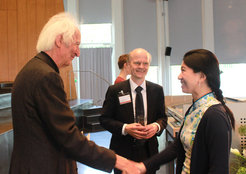Qianli Chen presents her research at the Annual Meeting of the Alexander von Humboldt Foundation

Qianli Chen, researcher at the Max Planck Institute for Polymer Research (MPI-P) and Humboldtian, had the honor to give a talk as representative of the Humboldt postdoc fellows in Germany. At the festive ceremony on June 4 she presented her research and her life in Germany to more than 1,200 invited scientists and politicians.
Chen has been at MPI-P since 2013 and was awarded a fellowship by the Alexander von Humboldt Foundation soon after. She holds a Dr. Sc. in physics from ETH Zurich.
The focus of her research is the fundamental processes in energy conversion devices, particularly in solar cells which convert the sun energy into electricity. Current silicon-based solar cells are expensive to manufacture, therefore low cost alternatives, such as sensitized solar cells, are necessary to bring the solar energy to our daily life. However, efforts are still needed to make them more efficient and stable. While it is known that their power conversion efficiency is influenced by the components in the heart of the device, namely the interface of the electrode, light absorber and electrolyte, our understanding of the underlying (electro) chemical processes between these components is still limited. To overcome the huge technical challenge to probe the (electro) chemical interactions on the molecular scale, Qianli Chen develops a novel type of microscope that allows the detection of the chemical fingerprint of the complex interface with nanometer resolution under realistic working conditions. The results from her work are expected to help pave the way for rational choice of materials and device design for sensitized solar cells.
